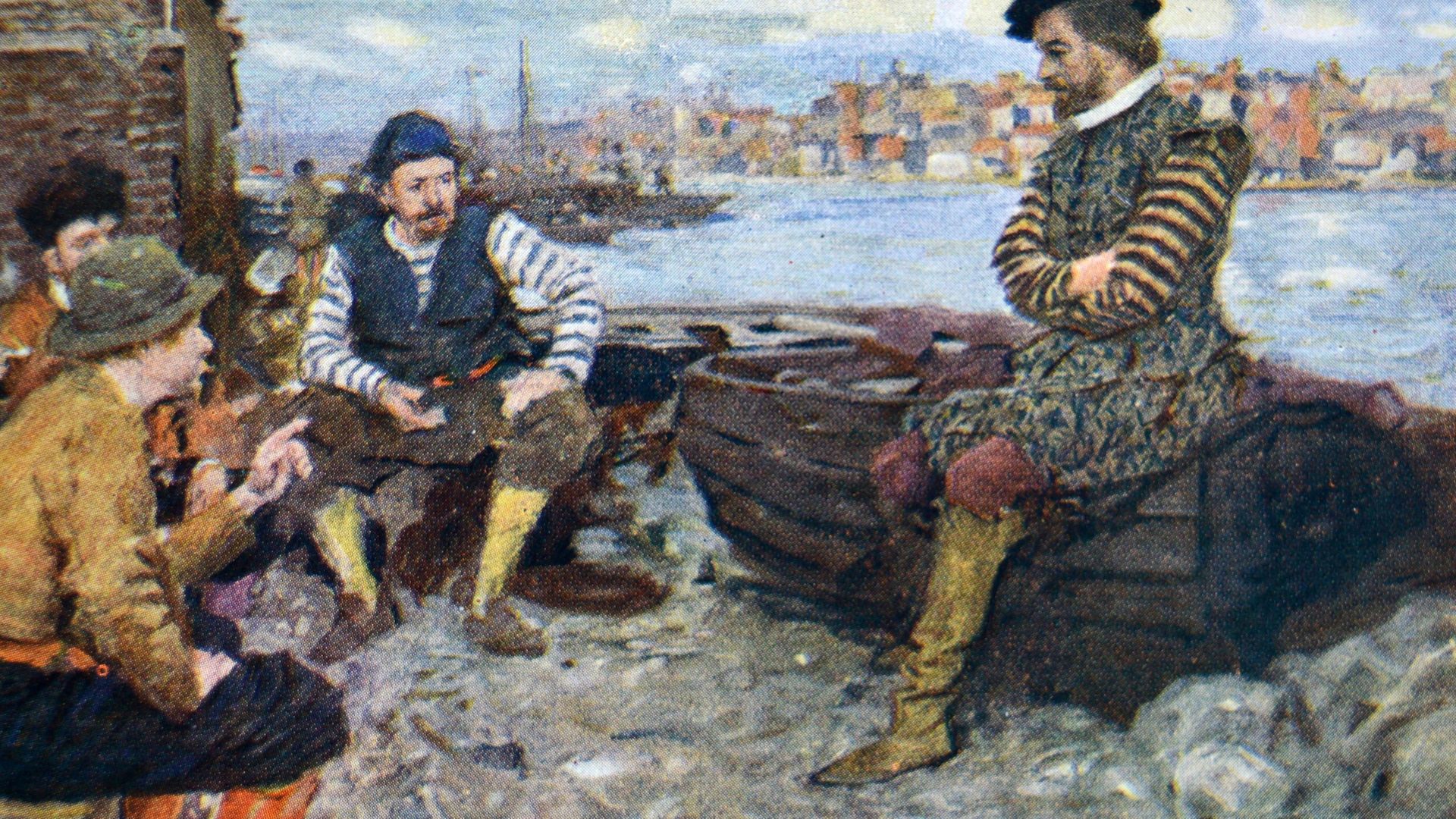I write this the morning after seeing the Changeling Theatre Company’s touring production of A Midsummer Night’s Dream performed outdoors in the grounds of a Kentish castle.
Golden evening sunlight, birdsong and the rustle of the wind in the trees were the perfect setting for a play whose scenes mostly play out in a forest, not to mention the open air and social-distancing presenting the audience with an ideal occasion to ease back into being part of a crowd again.
The play itself was magical, a production that transported us to a storybook forest with a healthy helping of RuPaul’s Drag Race thrown in, a fizzing, exuberant rendition that had the picnicking audience guffawing bits of scotch egg down their fleeces from the first scenes.
Wittily inserted references to Brexit and Covid that never felt gratuitous, a black woman in the roles of Hippolyta and Titania and a trans actor cartwheeling around the grass as an effervescent Puck made for a thoroughly modern production.
This Midsummer Night’s Dream showcased the arts in this country at its very best despite the challenges of a washed out 2020 and the company having to cram six months of rehearsals into three once lockdown restrictions were eased. The wait was more than worth it: here was a play and an occasion that was inclusive, celebratory and most of all terrific fun.
The ease with which contemporary asides were scattered throughout the performance partly illustrates why Shakespeare endures as Britain’s greatest literary figure.
As well as the company’s additions there was plenty in the original text to resonate with modern audiences. When during the second act Titania observes, “Therefore the moon, the governess of floods, pale in her anger, washes all the air; that rheumatic diseases do abound, and through this distemperature we see the seasons alter” a ripple of knowing glances spread among the camping chairs and tartan blankets.
Modern, positive, thought-provoking, joyous, escapist: this is why the glover’s son from Stratford-upon-Avon remains at the forefront of our national culture for all the right reasons.
Yet despite his enduring fame, now entering its fifth century, we know little about Shakespeare himself beyond what he left behind in the plays and sonnets themselves. Contemporary documentation is notoriously rare and there are whole periods of his life during which scholars can’t even be sure where he was, let alone what he was doing.
Nobody is certain exactly when each play was written and it’s unlikely the 37 we have represent all that he wrote for the stage. Even the spelling of his name is more down to custom than anything else as the handful of examples of Shakespeare’s signature that survive use several versions.
Even the familiar image of a bald man with neatly-trimmed facial hair was created after his death. He may have introduced more than 1,700 previously unknown words into the English language but William Shakespeare the man retains an enigmatic silence.
All of which present immense challenges for Shakespeare’s biographers. The few remaining primary sources have been consulted, pored over, interpreted and reinterpreted so many times there is nothing new to say about them, while every line of every play and poem has been probed and filleted for every scrap of nuance, context and subliminal reference. Without fresh evidence coming to light how much more is there to say about Shakespeare?
Nicholas Rowe is often credited with publishing the first biography of the playwright in 1709, although of his 8,000-word treatise on the Bard barely 1,000 are concerned with the story of his life. Since then Shakespeare has become a one-man publishing industry in his own right: a search of his name in the main catalogue at the British Library returns more than 16,000 items.
Short of the discovery behind an eave in an old house in Stratford-upon-Avon of a sheaf of ancient paper with ‘Bard Act To Follow: My Showbiz Life, by William Shakespeare’ on the front it’s difficult to make a convincing case for a new biography.
Which brings us to Boris Johnson. It’s been six years since the current prime minister’s book Shakespeare: The Riddle of Genius was announced by his publisher Hodder & Stoughton, who are understandably reticent about disclosing the size of Johnson’s advance.
Figures between £90,000 and £500,000 have been published in the media, both ends of which seem equally plausible. Even though it didn’t progress Churchill scholarship by one cigar’s length, his 2014 The Churchill Factor did well enough to ensure that a similar book would be worth a sizable advance for its high-profile author. There’s no doubt that a book about Shakespeare by Boris Johnson would sell in pretty decent quantities, no matter what a pile of Much Adoodoo he’s made of running the country.
Johnson’s Churchill book sold particularly well in America. Given how before the pandemic Stratford brimmed permanently with American tourists on Bardic pilgrimages it’s almost guaranteed a book on the subject by a man who has fostered an image of the quintessential bumbling English toff would be a big hit in the land of his birth.
The book was commissioned to appear in 2016, the 400th anniversary of Shakespeare’s death, but as we know to our cost Johnson was busy with other things that year and publication was postponed. When he became prime minister in 2019 Hodder & Stoughton conceded that the book had been put off indefinitely, with Johnson himself stating that his ascendance to the political summit “means that I won’t be able to rapidly complete a book on Shakespeare that I have in preparation. I honestly say that will grieve me”.
Despite laying apparently dormant since, Shakespeare: The Riddle of Genius has refused to go away. Rumoured to be among Dominic Cummings’ carefully managed drip feed of alleged Johnsonian faux-pas was the reason the prime minister didn’t show up for the five consecutive COBRA meetings dealing with the Covid outbreak: he was busy writing his Shakespeare book.
Then last month the Fence magazine revealed that in the early stages of the project a number of Shakespeare specialists had been approached to assist Johnson with his research, answering questions from the author who would then write up their responses for the book.
The publishers would, it seemed, get at least part of their rumoured half-million quids’ worth from the quality of Johnson’s probing questions and the pizzazz and panache with which he would render the answers in print. All the academics who came forward had apparently turned down the chance to work on Shakespeare: The Riddle of Genius, meaning Johnson may have to do more of the heavy lifting than he might have anticipated if the book is ever going to see what light through yonder window breaks.
It’s easy to scoff at the idea of an author filleting other people’s work for their own book. It’s really easy when that author is Boris Johnson. Yet it’s not necessarily as heinous an act as it might sound. Most narrative non-fiction draws by necessity on research carried out by other people, which is why you’ll rarely read a biography that doesn’t append at least a bibliography, if not a full-blown section of numbered notes at the end of the book. A subject, any subject, can after all only be taken forward as a result of what’s come before.
A book cannot just be a rehash of previously published research, however, especially if that book comes with a half a million quid advance. An author must unearth new material or at least bring something new to the existing evidence to present an original perspective on the subject.
As long as Johnson absorbs his research and interprets it with original thinking and a freshness of expression then maybe there is a Shakespeare book in him. A personal take on the Bard might be enlightening, detailing what the plays mean to Boris Johnson, how Shakespeare has affected and influenced him.
While shadow arts minister in 2004 he revealed in an interview that he won the Shakespeare Prize at Eton and expressed a desire to play Othello – more of that kind of thing could lead to a worthwhile book. Just setting out what little we already know of Shakespeare’s life and rehashing the opinions of others in sub-Wodehousian prose with a scattering of Latin and Ancient Greek won’t be nearly enough to justify a reader shelling out twenty quid for their hardback.
The publishers were marketing the book as Johnson’s examination of Shakespeare’s genius “in a simple and readable way; in a way that gets to grips with what is really going on, what the characters are up to, what the point of it all is; and in a way that sets the man simply and intelligibly in the context of his time”.
One can only wonder at what Johnson thinks is “really going on” and what he believes “the point of it all is” when it comes to Shakespeare’s life and work. If he’s demonstrated anything as prime minister it’s that he’s not a man for introspection, reflection or particularly deep thinking.
The fact he can quote lines from Shakespeare from memory only suggests he developed an aptitude for rote learning at school and there’s nothing impressive about that.
I can reel off all the winners of the FA Cup from its inception in 1872 to 1990. Can I apply that to, say, writing a book on how it relates to the socio-economic conditions of different eras? No, I cannot, because storing that knowledge in my head doesn’t make me clever or insightful, it just shows I was a lonely kid with a well-thumbed copy of the Rothmans Football Yearbook. Knowing stuff isn’t enough. Filtering it through an original critical mind is what makes a book.
From what we know of the man it’s hard to imagine Johnson’s interpretation of Shakespeare being in any way groundbreaking, or even vaguely nuanced. When he saw Ben Whishaw as Hamlet at the Old Vic in the mid-2000s, for example, Johnson complained Whishaw “didn’t know his lines”. The example he quoted turned out to be a deliberate change by the director Trevor Nunn to suit the production that Johnson, the rote-learner, had assumed was an error.
Such limited intellectual curiosity and unwillingness to accept artistic interpretation doesn’t fill one with confidence that Johnson’s Shakespeare will be the outward-looking European who travelled widely, sought out and read plays in French and Italian for inspiration and in the later years of his life lodged with a family of Huguenot refugees in London’s Cripplegate.
That’s the Shakespeare I saw represented in the castle grounds. The Shakespeare whose ear was finely tuned to human nature with all its joys, flaws, kindnesses, challenges, betrayals, farces and fears, whose emotional intelligence allowed him to distil all the world’s comedy and tragedy into iambic pentameter in a way we recognise today.
The Shakespeare who can inspire a troupe of young actors, travelling as a company just as Shakespeare did, to add surgical masks and a forehead temperature gun to a fantasy about fairies and woodland magic written more than 400 years ago.
As Puck cartwheeled and backflipped through the golden evening sunshine there was a tangible communion between audience and players brought about through words written around the turn of the 17th century. The words are where Shakespeare remains alive, because he belongs to all of us.
Despite Johnson’s book title there is no riddle of his genius. It’s palpable and alive, deeply ingrained in the very best of our wide-ranging, inclusive culture.
FIVE GREAT BOOKS ABOUT SHAKESPEARE
HAMNET
Maggie O’Farrell (Tinder Press, £7.99)
The winner of the Women’s Prize for Fiction last year, O’Farrell’s account of Shakespeare’s life viewed through his family around the time of the death of their son Hamnet is a towering achievement. From Stratford to the Globe Theatre in London this is an outstanding conjuring of a very human Bard.
SHAKESPEARE: THE WORLD AS A STAGE
Bill Bryson (Harper, £8.99)
On the face of it Bill Bryson is no more qualified to write a book about Shakespeare than Boris Johnson, but the man best known for his travel writing produced a wise, informative and concise exploration of the man, his times and his work.
WHAT BLEST GENIUS: THE JUBILEE THAT MADE SHAKESPEARE
Andrew McConnell Scott (W.W. Norton, £16.99)
A beautifully written account of the three-day festival staged in Stratford-upon-Avon in 1769 organised by the actor David Garrick and attended by James Boswell and other luminaries of the time, the event that effectively elevated Shakespeare to the status of a national treasure.
THIS IS SHAKESPEARE: HOW TO READ THE WORLD’S GREATEST PLAYWRIGHT
Emma Smith (Pelican, £9.99)
Described by Alex Preston in the Observer as “the best introduction to the plays I’ve read, perhaps the best book on Shakespeare, full stop”, this is a thoroughly absorbing analysis of the Bard’s output by an Oxford professor of Shakespeare. Fresh, original and authoritative.
1599: THE YEAR THAT MADE SHAKESPEARE
James Shapiro (Faber & Faber, £10.99)
A groundbreaking book when first published in 2006, Shapiro finds his way into Shakespeare by sticking to the year in which Henry V, Julius Caesar, As You Like It and Hamlet were written and delving into the playwright and his world to extraordinary effect. Look out for Shapiro’s 1606: The Year of Lear, too












